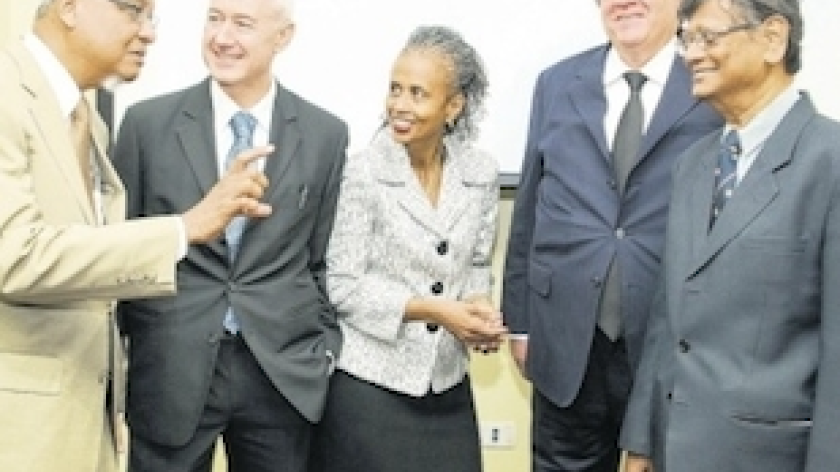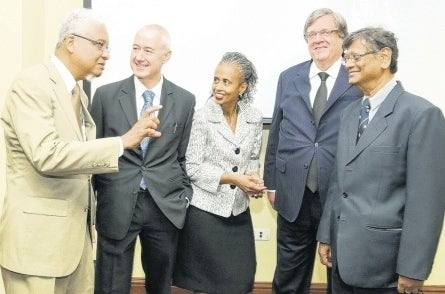
That is the future for Jamaica — one which a collaboration among the University of the West Indies (UWI), The Global Environment Facility (GEF) and the United Nations Environment Programme (UNEP) is seeking to make possible.

Left to right: Professor E Nigel Harris, Vice Chancellor, University of the West Indies (UWI) in conversation at the launch of the Promoting Energy Efficiency and Renewable Energy in Buildings project, with Professor Anthony Clayton; Dr Camille Bell-Hutchinson; Edu Hassing and Professor Tara Dasgupta.
They are called zero-energy/energy-plus buildings (ZEB/EB) and work by combining energy-efficient designs with efficient sources of energy so that they produce their own energy, and then some.
Under the Promoting Energy Efficiency & Renewable Energy in Buildings project, recently launched at the UWI by Vice Chancellor, Professor E Nigel Harris, Jamaica is to lead the way in the Caribbean in the development of these buildings. Led by Professor Anthony Clayton and Professor Tara Dasgupta from the UWI's Institute of Sustainable Development (ISD), the project will deliver an advanced prototype of a zero-energy/energy-plus building in Jamaica - the first for the island and the region. The model will be sited at the UWI, Mona.
Speaking at the launch event, Mr Edu Hassing, representative of the GEF/UNEP said "a unique feature of the project is that it aims to increase energy efficiency in the buildings and at the same time make use of renewable energy in buildings, thereby reducing the emission of greenhouse gases which lead to global warming".
He said further that it was envisaged that "the building of a zero-energy demonstration building and the retrofitting of an existing building to become more energy efficient will result in new building codes, regulations and practices, and the buildings will be replicated not only in Jamaica, but the region and other countries with similar climatic conditions".
"The buildings are to come on stream in the next two to three years," the ISD told the Jamaica Observer, adding that while it might not immediately become development policy, it is hoped that they will be widely accepted.
That is the future for Jamaica — one which a collaboration among the University of the West Indies (UWI), The Global Environment Facility (GEF) and the United Nations Environment Programme (UNEP) is seeking to make possible.